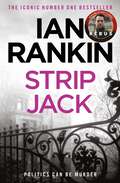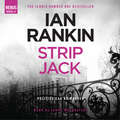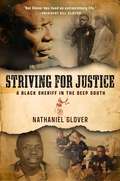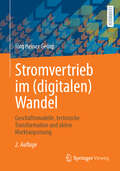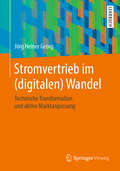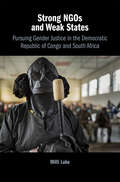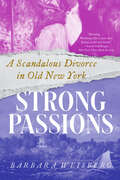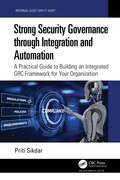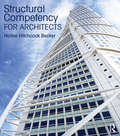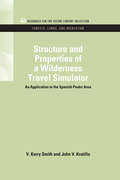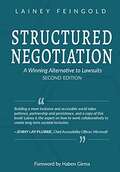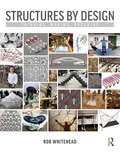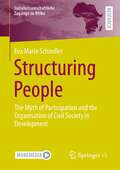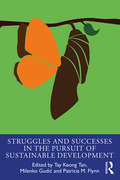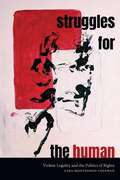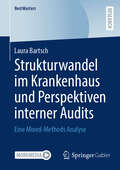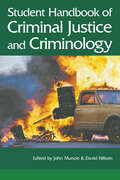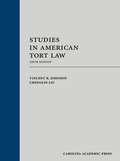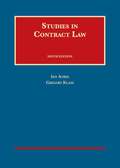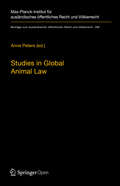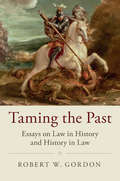- Table View
- List View
Strip Jack: From the Iconic #1 Bestselling Writer of Channel 4’s MURDER ISLAND (A Rebus Novel)
by Ian RankinThe fourth Inspector Rebus novel from the No.1 bestselling author of A SONG FOR THE DARK TIMES - 'unmatched in the field of British crime fiction' THE TIMES.Gregor Jack, MP, well-liked, young, married to the fiery Elizabeth - to the outside world a very public success story. But Jack's carefully nurtured career plans take a tumble after a 'mistake' during a police raid on a notorious Edinburgh brothel. Then Elizabeth disappears, a couple of bodies float into view where they shouldn't, and a lunatic speaks from his asylum...Initially Rebus is sympathetic to the MP's dilemma - who hasn't occasionally succumbed to temptation? - but with the disappearance of Jack's wife the glamour surrounding the popular young man begins to tarnish. Someone wants to strip Jack naked and Rebus wants to know why...
Strip Jack: From the Iconic #1 Bestselling Writer of Channel 4’s MURDER ISLAND (A Rebus Novel)
by Ian RankinThe fourth Inspector Rebus novel from the No.1 bestselling author of A SONG FOR THE DARK TIMES - 'unmatched in the field of British crime fiction' THE TIMES.Gregor Jack, MP, well-liked, young, married to the fiery Elizabeth - to the outside world a very public success story. But Jack's carefully nurtured career plans take a tumble after a 'mistake' during a police raid on a notorious Edinburgh brothel. Then Elizabeth disappears, a couple of bodies float into view where they shouldn't, and a lunatic speaks from his asylum...Initially Rebus is sympathetic to the MP's dilemma - who hasn't occasionally succumbed to temptation? - but with the disappearance of Jack's wife the glamour surrounding the popular young man begins to tarnish. Someone wants to strip Jack naked and Rebus wants to know why...
Strip Jack: From the Iconic #1 Bestselling Writer of Channel 4’s MURDER ISLAND (A Rebus Novel)
by Ian RankinGregor Jack, MP, well-liked, young, married to the fiery Elizabeth - to the outside world a very public success story. But Jack's carefully nurtured career plans take a tumble after a 'mistake' during a police raid on a notorious Edinburgh brothel. Then Elizabeth disappears, a couple of bodies float into view where they shouldn't, and a lunatic speaks from his asylum...Initially Rebus is sympathetic to the MP's dilemma - who hasn't occasionally succumbed to temptation? - but with the disappearance of Jack's wife the glamour surrounding the popular young man begins to tarnish. Someone wants to strip Jack naked and Rebus wants to know why...Read by James Macpherson(p) 2003 Orion Publishing Group
Striving for Justice: A Black Sheriff in the Deep South
by Nat GloverOn a sweltering day in August 1960, in the segregated Deep South city of Jacksonville, Florida, a seventeen-year-old Black boy finished his dishwashing job at Morrison&’s Cafeteria, walked out the back door, and found himself in the middle of a nightmare. Hundreds of white men with ax handles and baseball bats were attacking Black sit-in protestors in Hemming Park. Suddenly surrounded, the young man endured menacing blows and racist taunts. He called for help from a white police officer standing nearby, but no help came. And he felt an unwarranted shame he determined never to feel again. His name was Nat Glover. Nat&’s life could have ended that day, but instead, the ordeal reinforced his plans to become a police officer. His belief in a better world could have faded to cynicism, but instead, it took root in his spirit. His desire to overcome the poverty and racism of his youth could have given in to shame, but instead, Nat resolved to dedicate his life to honoring the dignity of all people. Nat Glover went on to serve in law enforcement for thirty-seven years, became the first Black sheriff in Jacksonville, Florida, and the state of Florida in over a hundred years post-Reconstruction, and chose—again and again—to do the right thing at the right time for the sake of justice, compassion, and truth. In Striving for Justice, Nat recounts his history-making years in police reformation, the values that fuel him as a leader and American citizen, and what he believes will move this country forward toward hope and healing just as he once rose again…against all odds.
Stromvertrieb im (digitalen) Wandel: Geschäftsmodelle, technische Transformation und aktive Marktanpassung
by Jörg Heiner GeorgIn diesem Lehrbuch wird ein grundlegendes Verständnis für Geschäftsmodelle speziell im Stromvertrieb vermittelt und wesentliche Funktionen des Betriebsmodells (Aufbau- und Ablauforganisation) erklärt. Dabei hat der Autor auf Praxisbezug Wert gelegt und sowohl die Treiber der Digitalisierung als auch die Wirkungsmechanismen der Transformation sowie datengetriebene Geschäftsmodelle beschrieben. Architektur und systematischer Aufbau möglicher Geschäftsmodelle sind anhand von Teilmodellen nachvollziehbar dargestellt und veranschaulicht. Das Buch hilft Studierenden energietechnischer, energiewirtschaftlicher und angrenzender Fachbereiche aktuelle Modelle zu verstehen, zu analysieren und schafft damit die Grundvoraussetzung diese Kenntnisse im späteren Berufsleben einzusetzen. Die vorliegende Neuauflage trägt mit einem eigenen Kapitel der rasanten Entwicklung der Elektromobilität Rechnung und zeigt verschiedene Geschäftsmodellansätze im Bereich des Ladestromvertriebs auf. Zudem wird die zunehmende digitale Vernetzung von dezentralen Stromerzeugungsanlagen und flexiblen Verbrauchsgeräten unter Einbindung von KI und dynamischen Tarifen thematisiert.
Stromvertrieb im (digitalen) Wandel: Technische Transformation und aktive Marktanpassung
by Jörg Heiner GeorgIn diesem Lehrbuch wird ein grundlegendes Verständnis für Geschäftsmodelle speziell im Stromvertrieb vermittelt und wesentliche Funktionen des Betriebsmodells (Aufbau- und Ablauforganisation) erklärt. Dabei hat der Autor auf auf Praxisbezug Wert gelegt und sowohl die Treiber der Digitalisierung als auch die Wirkungsmechanismen der Transformation sowie datengetriebene Geschäftsmodelle beschrieben. Architektur und systematischer Aufbau möglicher Geschäftsmodelle sind anhand von Teilmodellen nachvollziehbar dargestellt und veranschaulicht. Das Buch hilft Studierenden energietechnischer, energiewirtschaftlicher und angrenzender Fachbereiche aktuelle Modelle zu verstehen, zu analysieren und schafft damit die Grundvoraussetzung diese Kenntnisse im späteren Berufsleben einzusetzen.
Strong Managers, Strong Owners
by Harry Korine Pierre-Yves GomezThe family firm preparing generational change, the partnership that welcomes new partners, and the shareholders of a firm that chooses to go public are making decisions that will have an impact on strategy and management. Conversely, a change in strategy such as a move to diversify or a decision to take on more risk in a business can make the firm more attractive to some shareholders and less attractive to others and is therefore not ownership neutral. Opening the black box of agency theory, Korine and Gomez show how management and ownership interact to shape the strategy of the firm. In their view, the critical question to ask is not what is the best strategy, but rather, who is the strategy for? With numerous detailed examples, Strong Managers, Strong Owners is an invaluable resource for company owners, board members and executives, as well as their advisors in strategy and governance.
Strong NGOs and Weak States: The Pursuit Of Gender Justice In The Democratic Republic Of Congo And South Africa
by Milli LakeOver the past decade, DR Congo and South Africa have attracted global attention for high rates of sexual and gender-based violence. Why is it that courts in eastern DR Congo have offered a robust judicial response, prioritizing gender crimes despite considerable logistical challenges, whilst courts in South Africa, home to a far stronger legal infrastructure and human rights record, have failed to provide justice to victims of similar crimes? <P><P>Lake shows that state fragility in DR Congo has created openings for human rights NGOs to influence legal processes in ways that have proved impossible in countries like South Africa, where the state is stronger. Yet exploiting opportunities presented by state fragility to pursue narrow human rights goals invites a host of new challenges. Strong NGOs and Weak States documents the promises and pitfalls of human rights and rule of law advocacy undertaken by NGOs in strong and weak states alike.<P> Challenges existing knowledge of human rights and transnational advocacy by demonstrating that NGOs often show more immediate, direct and visible results of their human rights advocacy in weak states than in strong ones.<P> Advises policy-makers, practitioners, and donors in the fields of human rights and the rule of law of the unintended consequences of bypassing the central state in pursuit of narrow human rights goals.<P> Authored by a scholar and practitioner possessing first-hand expertise in human rights advocacy, rule of law development, and legal capacity building across sub-Saharan Africa.
Strong Passions: A Scandalous Divorce in Old New York
by Barbara Weisberg“Riveting.… Weisberg tells a story that fiction could not touch.” —Liesel Schillinger, New York Times Book Review? Shocking revelations of a wife’s adultery explode in an incendiary nineteenth-century trial, exposing upper-crust New York society and its secrets. What could possibly go wrong in a wealthy matriarch’s country home when her dilettante son, his restless wife, and his widowed brother live there together? Strong Passions, rooted in the beguiling times of Edith Wharton’s “old New York,” recounts the true story of a tumultuous marriage. In 1862, Mary Strong stunned her husband, Peter, by confessing to a two-year affair with his brother. Peter sued Mary for divorce for adultery—the only grounds in New York—but not before she accused him of forcing her into an abortion and having his own affair with the abortionist. She then kidnapped their young daughter and disappeared. The divorce trial Strong v. Strong riveted the nation during the final throes and aftermath of the Civil War, offering a shocking glimpse into the private world of New York’s powerful and privileged elite. Barbara Weisberg presents the chaotic courtroom and panoply of witnesses—governess, housekeeper, private detective, sisters-in-law, and many others—who provided contradictory and often salacious testimony. She then asks us to be the jury, deciding each spouse’s guilt and the possibility of a just resolution. Social history at its most intimate, Strong Passions charts a trial’s twists and turns to portray a family and country in turmoil as they faced conflicts over women’s changing roles, male custody of children, and men’s power—financial and otherwise—over wives.
Strong Security Governance through Integration and Automation: A Practical Guide to Building an Integrated GRC Framework for Your Organization (Internal Audit and IT Audit)
by Priti SikdarThis book provides step by step directions for organizations to adopt a security and compliance related architecture according to mandatory legal provisions and standards prescribed for their industry, as well as the methodology to maintain the compliances. It sets a unique mechanism for monitoring controls and a dashboard to maintain the level of compliances. It aims at integration and automation to reduce the fatigue of frequent compliance audits and build a standard baseline of controls to comply with the applicable standards and regulations to which the organization is subject. It is a perfect reference book for professionals in the field of IT governance, risk management, and compliance. The book also illustrates the concepts with charts, checklists, and flow diagrams to enable management to map controls with compliances.
Structural Competency for Architects
by Hollee Hitchcock BeckerStructural Competency for Architects is a comprehensive volume covering topics from structural systems and typologies to statics, strength of materials, and component design. The book includes everything you need to know about structures for the design of components, as well as the logic for design of structural patterns, and selection of structural typologies. Organized into six key modules, each chapter includes examples, problems, and labs, along with an answer key available on our website, so that you learn the fundamentals. Structural Competency for Architects will also help you pass your registration examinations.
Structure and Properties of a Wilderness Travel Simulator: An Application to the Spanish Peaks Area (RFF Forests, Lands, and Recreation Set)
by John V. Krutilla V. Kerry SmithFirst Published in 2011. Routledge is an imprint of Taylor & Francis, an informa company.
Structured Negotiation: A Winning Alternative to lawsuits
by Lainey FeingoldLainey is the expert on how to work collaboratively to create long term societal inclusion.” — Jenny Lay-Flurrie, Chief Accessibility Officer, Microsoft “This fantastic guide to structured negotiations provides valuable insights for anyone interested in becoming a better advocate. I really enjoyed reading this book and appreciate all the lessons within.” — Haben Girma, Human rights lawyer and author of the best seller, Haben, the Deafblind Woman Who Conquered Harvard Law. ——— Structured Negotiation: A Winning Alternative to Lawsuits shares stories and strategies from 25 years of successful collaborations between the disability community and some of the largest public and private organizations in the United States. Born at the intersection of accessibility, technology, disability, and dispute resolution, the pioneering strategy described in this book has been instrumental in creating a more inclusive digital world for a quarter century. First published by the American Bar Association, the Second Edition includes new Structured Negotiation win-wins, other new content, and Forewords by Haben Girma, author of the best-selling Haben: The Deafblind Woman Who Conquered Harvard Law and by Susana Sucunza, Basque Country Spain collaborative lawyer and president of the Basque Country Collaborative Law Association. Not just for lawyers, the book offers an effective and path-breaking method to resolve disputes without lawsuits, and to lessen the conflict and expense of filed cases. Lawsuits play an important role in moving society forward. But the legal profession ― and the public it serves ― deserve less costly, less stressful, and more cooperative and ethical alternatives. Clients need a forum where stories matter. Would-be defendants need a process that allows them to do the right thing without having to prove there is no problem to begin with.
Structures by Design: Thinking, Making, Breaking
by Rob WhiteheadStructures by Design: Thinking, Making, Breaking is a new type of structures textbook for architects who prefer to learn using the hands-on, creative problem-solving techniques typically found in a design studio. Instead of presenting structures as abstract concepts defined by formulas and diagrams, this book uses a project-based approach to demonstrate how a range of efficient, effective, and expressive architectural solutions can be generated, tested, and revised. Each section of the book is focused on a particular manner by which structural resistance is provided: Form (Arches and Cables), Sections (Beams, Slabs, and Columns), Vectors (Trusses and Space Frames), Surfaces (Shells and Plates), and Frames (Connections and High-Rises). The design exercises featured in each chapter use the Think, Make, Break method of reiterative design to develop and evaluate different structural options. A variety of structural design tools will be used, including the human body, physical models, historical precedents, static diagrams, traditional formulae, and advanced digital analysis. The book can be incorporated into various course curricula and studio exercises because of the flexibility of the format and range of expertise required for these explorations. More than 500 original illustrations and photos provide example solutions and inspiration for further design exploration.
Structuring People: The Myth of Participation and the Organisation of Civil Society in Development (Sozialwissenschaftliche Zugänge zu Afrika)
by Eva Marie SchindlerParticipation has become an orthodoxy in the field of development, an essential element of projects and programmes. This book analyses participation in development interventions as an institutionalised expectation – a rationalized myth – and examines how organisations on different levels of government process it. At least two different objectives of participation are appropriate and legitimate for international organisations in the field: the empowerment of local beneficiaries and the achievement of programme goals. Both integrate participatory forums into the organisational logic of development interventions. Local administrations react to the institutionalised expectation with means-ends decoupling, where participatory forums are implemented superficially but de facto remain marginalised in local administrative processes and activities. The book furthermore provides a thick description of the organisationality of participation in development interventions. Participatory forums are shown to be a form of partial organisation. They establish an order in the relationship between administrations and citizens through the introduction of rules and the creation of a defined membership. At the same time, this order is found to be fragile and subject to criticism and negotiation.
Struggles and Successes in the Pursuit of Sustainable Development (The Principles for Responsible Management Education Series)
by Patricia M. Flynn Tay Keong Tan Milenko GudićThe challenges associated with the struggles for attainment of the Sustainable Development Goals (SDGs) and objectives are as diverse and complex as the variety of human societies, national conditions and natural ecosystems worldwide. Despite decades of economic growth and technological advances, our world is plagued by poverty, hunger, disease, conflicts and inequality, and many societies are under the strain of environmental changes and governance failure. Such global-scale challenges call for the SDGs to be translated beyond bold concepts and aspirational targets into concrete programs and feasible plans that are substantively valuable, locally acceptable, pragmatic and operationally implementable. In the pursuit of the SDGs, positive results are far from guaranteed. Success is uncertain. Instead, the path forward requires difficult learning, experimentation and adaptation by multiple stakeholders. Loss and sacrifice are foreseeable and often inevitable. This important book captures the lessons from ongoing struggles and the early successes. Productive failures and emerging practices are identified, analyzed and promulgated for interdisciplinary learning by, and for the inspiration of, like-minded individuals, organizations, communities and nations worldwide. They can also inform and enrich the curricula in universities, training institutions and schools to prepare future generations of citizens, leaders and activists with the ethos and values of sustainability and social responsibility. The book offers a platform for academics, practitioners and concerned global citizens to identify pathways forward on the immense challenges of sustainability.
Struggles for the Human: Violent Legality and the Politics of Rights (Global and Insurgent Legalities)
by Lara Montesinos ColemanIn Struggles for the Human, Lara Montesinos Coleman blends ethnography, political philosophy, and critical theory to reorient debates on human rights through attention to understandings of legality, ethics, and humanity in anticapitalist and decolonial struggle. Drawing on her extensive involvement with grassroots social movements in Colombia, Coleman observes that mainstream expressions of human rights have become counterparts to capitalist violence, even as this discourse disavows capitalism’s deadly implications. She rejects claims that human rights are inherently tied to capitalism, liberalism, or colonialism, instead showing how human rights can be used to combat these forces. Coleman demonstrates that social justice struggles that are rooted in marginalized communities’ lived experiences can reframe human rights in order to challenge oppressive power structures and offer a blueprint for constructing alternative political economies. By examining the practice of redefining human rights away from abstract universals and contextualizing them within concrete struggles for justice, Coleman reveals the transformative potential of human rights and invites readers to question and reshape dominant legal and ethical narratives.
Strukturwandel im Krankenhaus und Perspektiven interner Audits: Eine Mixed-Methods Analyse (BestMasters)
by Laura BartschDer Gesundheitssektor steht vor komplexen Herausforderungen und Veränderungen, die durch dynamische Umstrukturierungen bewältigt werden können. Eine agile Arbeitsweise ermöglicht hierbei eine flexible Anpassungsfähigkeit. Besonders im Fokus steht das Qualitätsmanagement in Krankenhäusern, wobei interne Audits und deren Prüfprozesse betrachtet werden. Um die Patienten- und Qualitätssicherung zu optimieren und auf kontinuierliche Veränderungen zu reagieren, bietet die agile Auditierung mit einem iterativen Ansatz großes Potenzial.
Student Handbook of Criminal Justice and Criminology
by John Muncie David WilsonWritten by some of the leading criminologists in the country, this new title is a 'one-stop shop' for those who teach, study or are interested in criminology and the criminal justice systems of the UK.
Students, Colleges, and Disability Law
by Stephen B. ThomasThis text examines the obligations and rights of students with disabilities and the institutions they attend in higher education, including guidelines for university administrators.
Studies In Contract Law (University Casebook)
by Ian Ayres Gregory KlassIn the Ninth Edition of Studies in Contract Law, Ian Ayres and Greg Klass have continued their work of streamlining, updating and supplementing this classic casebook. The new edition includes extensive discussion of the Draft Restatement (Third) of Consumer Contracts. There are new cases on telemarketing, good faith, the perfect tender rule, warranties and reliance, half-truths, fraud liability between contracting parties, class arbitration, adequate assurances, mitigation, mental anguish, intentional interference, and personal services contracts. And the authors have added three new drafting exercises to the many practice problems that the book has always included.
Studies in Global Animal Law (Beiträge zum ausländischen öffentlichen Recht und Völkerrecht #290)
by Anne PetersThis open access book contains 13 contributions on global animal law, preceded by an introduction which explains key concepts and methods. Global Animal Law refers to the sum of legal rules and principles (both state-made and non-state-made) governing the interaction between humans and other animals, on a domestic, local, regional, and international level. Global animal law is the response to the mismatch between almost exclusively national animal-related legislation on the one hand, and the global dimension of the animal issue on the other hand. The chapters lay some historical foundations in the ius naturae et gentium, examine various aspects of how national and international law traditionally deals with animals as commodity; and finally suggest new legal concepts and protective strategies. The book shows numerous entry points for animal issues in international law and at the same time shifts the focus and scope of inquiry.
Studies in Legal History: Criminal Law in Liberal and Fascist Italy
by Paul GarfinkelBy extending the chronological parameters of existing scholarship, and by focusing on legal experts' overriding and enduring concern with 'dangerous' forms of common crime, this study offers a major reinterpretation of criminal-law reform and legal culture in Italy from the Liberal (1861-1922) to the Fascist era (1922-43). Garfinkel argues that scholars have long overstated the influence of positivist criminology on Italian legal culture and that the kingdom's penal-reform movement was driven not by the radical criminological theories of Cesare Lombroso, but instead by a growing body of statistics and legal researches that related rising rates of crime to the instability of the Italian state. Drawing on a vast array of archival, legal and official sources, the author explains the sustained and wide-ranging interest in penal-law reform that defined this era in Italian legal history while analyzing the philosophical underpinnings of that reform and its relationship to contemporary penal-reform movements abroad.
Studies in Legal History: Essays on Law in History and History in Law (Studies in Legal History)
by Gordon Robert W.Lawyers and judges often make arguments based on history - on the authority of precedent and original constitutional understandings. They argue both to preserve the inspirational, heroic past and to discard its darker pieces - such as feudalism and slavery, the tyranny of princes and priests, and the subordination of women. In doing so, lawyers tame the unruly, ugly, embarrassing elements of the past, smoothing them into reassuring tales of progress. In a series of essays and lectures written over forty years, Robert W. Gordon describes and analyses how lawyers approach the past and the strategies they use to recruit history for present use while erasing or keeping at bay its threatening or inconvenient aspects. Together, the corpus of work featured in Taming the Past offers an analysis of American law and society and its leading historians since 1900.
